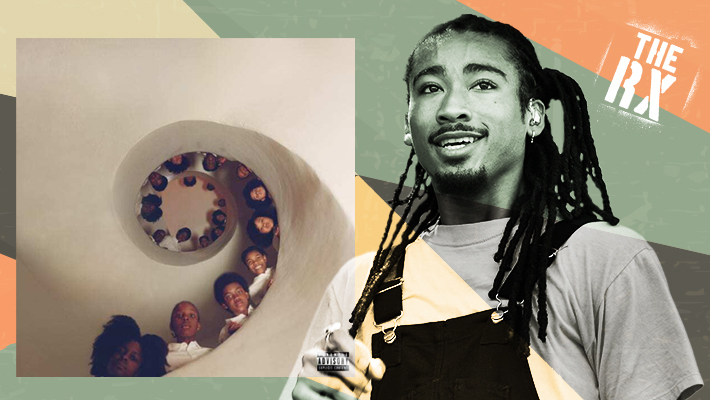The RX is Uproxx Music’s stamp of approval for the best albums, songs, and music stories throughout the year. Inclusion in this category is the highest distinction we can bestow, and signals the most important music being released throughout the year. The RX is the music you need, right now.
On his new album Don’t Go Tellin’ Your Momma, New Jersey rapper Topaz Jones tries to address some heavy questions. Five years removed from his solitary 2016 hit “Tropicana,” Jones pondered the implications of possibly having a platform with no substance; that isn’t to say that he didn’t have an interesting story to tell, he just had to figure out how to tell it.
In an interview with Rolling Stone, he said, “Now that I have a platform to tell my story, [I had] to really reckon with, well, ‘What is my story? What made me the person I am? What things about myself come from me directly? What things are passed down from my relatives? What’s my generational trauma?’ That was a whole lot of shit to balance out.”
Don’t Go Tellin’ Your Momma is the result of that introspection, and the method by which Jones ultimately resolved how to best answer those questions: A short film of the same name, detailing his upbringing in Montclair, New Jersey, combining magic realism, documentary, and even edutainment television to place his life in historical, familial, and cultural contexts.
The album, sprinkled with audio clips from the film in which his family members recount beloved anecdotes and dynastic legends, spins out of those ideas to verbally expound Jones’ thoughts on subjects like love, legacy, history, racism, hustling, and dreaming of a better life. Over the 13 whimsical, groovy, lush, and occasionally disorienting tracks, he doesn’t necessarily find all the answers, but then again, this was always more of a “finding yourself in the journey” proposition anyway.
Production-wise, Don’t Go Tellin’ Your Momma is something of a masterpiece. It’s rare that any artist puts so much thought into instrumentation and expansive genre exploration — especially with how much territory technology has opened up. Jones charts paths through spacey grooves on “Baba 70s,” “Gold,” and “Blue,” incites some hip-wiggling on the dancey “Amphetamines” and “Herringbone,” and stank faces his way through a thicket of throwback, funky hip-hop on “Who?” with Maxo and Phonte Coleman and album closer “Buggin’.”
The live instrumentation evokes smokey lounges, and darkened basement parties from the 1970s, only more timeless. Musically, the technique reinforces the lyrical links Jones traces throughout his family history and nostalgic narratives. The exquisite soundscapes could easily overwhelm a less adept lyricist, but Jones has clearly been using the time since his 2016 album Arcade to sharpen his pen game.
On “Buggin’,” Jones deftly details a twitchy tableau that could just as easily be a scene set in any hood in America, threading a neat metaphorical connection to insects throughout the narrative the way an auteur might draw the eye to a physical placeholder for a conceptual thought — as only befits a rapper turned director turned back to rapper, explaining his vision with dense wordplay and scintillating twists of the tongue.
Likewise, Topaz lets the syllables spill over each other in his verses on “Mirror,” a self-effacing reintroduction to both longtime listeners and potential new fans that highlights his polished gift for both setting a scene and impressing with dazzling displays of verbose wit. On “Herringbone,” he describes a family reunion in such charming, achingly familiar terms, you might be able to taste the collard greens and smell the macaroni baking in the oven.
Throughout the album, the rhymes sit so snugly within the pockets of the soulful beats that listening becomes nearly interactive; Topaz invites you in, and rewards your interest in every unexpected turn of phrase and tempo change. The tales he tells are personal but relatable; he could just as easily be telling any listener’s story, or that of a cousin, brother, or neighbor at a family reunion, recounting the events of the spell since the last get-together.
And that’s really the answer, told both through the film and the album. Our experiences are universal because the same things move us. The same things are important to us. We can put ourselves in Topaz’s shoes just as easily as he can put himself in ours; the same holds true across generations, geography, and any other line we can draw between ourselves and anyone else. Don’t Go Tellin’ Your Momma is a story about the stories we tell each other and ourselves, the ones that are told to us, and the ones that tell us who we are.
Don’t Go Tellin’ Your Momma is out now via New Funk Academy / Black Canopy. Get it here.





